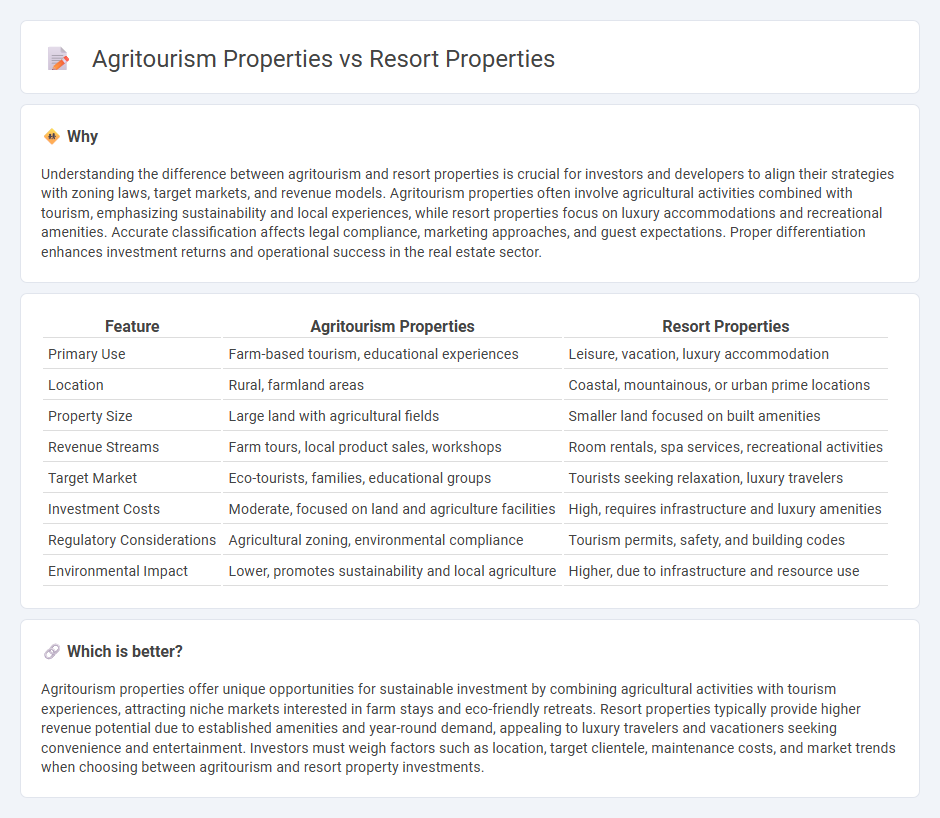
Agritourism properties offer immersive rural experiences, combining farming activities with hospitality, whereas resort properties focus on luxury accommodations and recreational amenities. Farm stays, vineyard tours, and hands-on agricultural workshops characterize agritourism, contrasting with spas, golf courses, and beachfront access typical of resorts. Explore the unique benefits and investment opportunities of both property types to make an informed real estate decision.
Why it is important
Understanding the difference between agritourism and resort properties is crucial for investors and developers to align their strategies with zoning laws, target markets, and revenue models. Agritourism properties often involve agricultural activities combined with tourism, emphasizing sustainability and local experiences, while resort properties focus on luxury accommodations and recreational amenities. Accurate classification affects legal compliance, marketing approaches, and guest expectations. Proper differentiation enhances investment returns and operational success in the real estate sector.
Comparison Table
| Feature | Agritourism Properties | Resort Properties |
|---|---|---|
| Primary Use | Farm-based tourism, educational experiences | Leisure, vacation, luxury accommodation |
| Location | Rural, farmland areas | Coastal, mountainous, or urban prime locations |
| Property Size | Large land with agricultural fields | Smaller land focused on built amenities |
| Revenue Streams | Farm tours, local product sales, workshops | Room rentals, spa services, recreational activities |
| Target Market | Eco-tourists, families, educational groups | Tourists seeking relaxation, luxury travelers |
| Investment Costs | Moderate, focused on land and agriculture facilities | High, requires infrastructure and luxury amenities |
| Regulatory Considerations | Agricultural zoning, environmental compliance | Tourism permits, safety, and building codes |
| Environmental Impact | Lower, promotes sustainability and local agriculture | Higher, due to infrastructure and resource use |
Which is better?
Agritourism properties offer unique opportunities for sustainable investment by combining agricultural activities with tourism experiences, attracting niche markets interested in farm stays and eco-friendly retreats. Resort properties typically provide higher revenue potential due to established amenities and year-round demand, appealing to luxury travelers and vacationers seeking convenience and entertainment. Investors must weigh factors such as location, target clientele, maintenance costs, and market trends when choosing between agritourism and resort property investments.
Connection
Agritourism properties and resort properties intersect through their shared focus on offering immersive, location-based experiences that combine leisure with nature or cultural heritage. Both property types often feature accommodation options alongside recreational amenities, attracting tourists seeking relaxation, educational activities, and farm-to-table dining experiences. Their connection enhances real estate value by tapping into the growing demand for sustainable tourism and experiential travel markets.
Key Terms
Hospitality
Resort properties offer luxury accommodations, extensive amenities, and recreational activities that cater to guests seeking relaxation and entertainment. Agritourism properties integrate agricultural experiences with hospitality, providing guests hands-on opportunities to engage with farm life, local produce, and rural culture. Explore the unique benefits and guest experiences of both hospitality sectors to determine the best investment for your tourism venture.
Farmland
Resort properties typically emphasize luxury amenities, recreational facilities, and scenic landscapes designed to attract tourists seeking leisure and relaxation. Agritourism properties, especially on farmland, integrate agricultural activities with tourism, offering authentic experiences like farm stays, crop harvesting, and educational workshops that promote sustainable agriculture. Discover how farmland-based agritourism can provide unique investment opportunities blending rural charm with eco-friendly tourism.
Amenities
Resort properties typically feature upscale amenities such as swimming pools, spas, golf courses, fine dining, and concierge services designed to provide luxury and relaxation. Agritourism properties offer amenities centered around farm experiences, including hands-on agricultural activities, fresh local produce, farm-to-table meals, and educational tours, appealing to visitors seeking authentic rural immersion. Explore more about how amenities influence guest experiences in these distinct property types.
Source and External Links
Four Seasons Hotels and Resorts - Offers luxury hotels and resorts worldwide, providing bespoke vacation experiences.
Hilton Resorts - Provides a range of resorts catering to diverse preferences, including beach, all-inclusive, luxury, spa, golf, and ski resorts.
Resort Properties of Angel Fire - Offers a variety of lodging options in Angel Fire, New Mexico, including condos and mountain homes with access to skiing and hiking trails.
 dowidth.com
dowidth.com